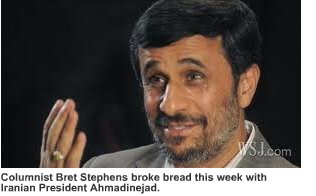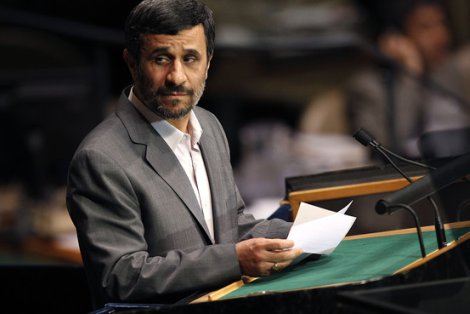Archives
September 23, 2010
Springtime With Hitler
...or Breakfast With Ahmadinejad? With all due respect to Bret Stephens (whom we do respect), his moment of revelation, as described below, deserves a resounding DUH.
Was this Mr. Stephens first time hearing Ahmadinejad speak? Did he miss A-mad's appearance some 4 yrs ago at the dinosaur Council of Foreign Relations? The event was billed by the Council as "Ahmadinejad Spars With CFR Members", but in reality, it was Ahmadinejad Outwits & Outshines CFR Members.
And what about A-mad's appearance at Wahhabi U. (aka Columbia University)? Did Stephens miss that one too? A-mad made Lee Bolinger, President of Columbia U. -- who touted the event as a victory for freedom of speech (so why not invite Bozo the Clown to speak next?!) -- and the rest of the crowd gathered at the so-called symposium, look like a bunch of clueless eggheads. Of course the New York Times described it as "a two-hour verbal contest at Columbia University", but trust us, it was no contest.
Stephens writes that "while none of us in the audience believes a word of Ahmadinejad's answer....we believe his self-belief..[a]nd we wonder whether he believes it, too." Which begs the question: Who's the bigger fool, i.e., the apocalyptic loon, who craves world attention and legitimacy, OR those who hand it to him on a silver platter, year after year after year?
The Wall Street Journal | September 23, 2010
Breakfast With Ahmadinejad
Lox, bagels and the 'Zionist regime.'
By Bret Stephens

New York -- It's a few minutes before eight in the morning on Tuesday, and the 30 or so journalists who have assembled to meet Mahmoud Ahmadinejad in the conference room of a midtown Manhattan hotel are gorging themselves on lox and bagels and wondering whether the buffet is some kind of sly catering joke. A prominent TV personality seated next to me is approached by an Iranian film crew wanting to know her thoughts about their president. She says something cringingly obsequious about how gracious he is for making himself available to the media.
I suppose she's simply trying to be polite, and perhaps taking care not to say anything that could cause trouble for her or her colleagues down the road. But it dawns on me that the exchange also captures the central dynamic of the meeting. We get access to Ahmadinejad - and the feeling of self-importance that goes with that. In exchange, we pay him court.
The first question goes to an editor from Fortune magazine, who wants to know how the Iranian economy is doing. Ahmadinejad devotes a good 10 minutes to extolling Iran's economic strengths - industrial exports have "tripled"; investment in infrastructure is way up; the service sector is thriving; agriculture has experienced "a gradual but consistent pattern of growth."
All of this is, of course, a lie, which is why the regime no longer allows its Central Bank to publish economic statistics. And yet it is a flawlessly delivered lie, spoken in the kind of modulated tone you would expect from an IMF technocrat. As a matter of performance, it's masterful. And while none of us in the audience believes a word of Ahmadinejad's answer, we believe him the way we believe Al Pacino when he inhabits a role. We believe his self-belief. And we wonder whether he believes it, too.

Iranian President Mahmoud Ahmadinejad Associated Press
Next question: the nuclear talks. "There is a good chance that talks will resume in the near future." Suddenly he has slipped back into an objective reality. Sure enough, word comes down the following day that the permanent members of the U.N. Security Council have "reaffirmed our commitment to continued and active engagement" with Iran, in the words of the EU's Catherine Ashton. The U.S. is a party to that statement.
Somebody asks about the status of opposition leaders Mir Hossein Mousavi and Mehdi Karroubi, both of whose offices were raided this month. Ahmadinejad flatly denies this, and once again we make a seamless transition back to the realm of the perfect lie, perfectly told.
Now CNN's Fareed Zakaria asks Ahmadinejad whether he would accept whatever deal Palestinians might strike with Israel in the current negotiations.
The question is meant as a trap—if he says no, he is potentially contradicting the Palestinians; if yes, he might have to recognize Israel's right to exist. Ahmadinejad's answer showcases his rhetorical gifts. He says he has no trouble deferring to the wishes of Palestinians; he merely wishes they be represented by the people they actually elected, meaning Hamas. In a stroke, he has put himself on the side of democracy and exposed the central fallacy of the current peace process, which is that a majority of Palestinians want to co-exist with a Jewish state called Israel.
A little later, under questioning about Iran's obstruction of U.N. nuclear inspectors, he points out that the "Zionist regime" operates under no U.N. nuclear strictures. Which makes for a powerful argument the moment you accept the premises of the Nuclear Nonproliferation Treaty.
By this point the questioning has become a little more testy. Ahmadinejad remains unflappable, even bemused. But there's also an undercurrent of menace in his answers, as if he knows he owes his audience the frisson of danger that is his trademark. In response to a question about a prospective Israeli airstrike, he says "the Zionist regime is a very small entity on the map and doesn't really factor into our decisions." As for a U.S. attack, he warns that "war is not just bombing someplace. When the war starts, it knows no limits."
In the New York Times's account of the breakfast, reporter Neil MacFarquhar - who asked an opaque question about Cyrus the Great and was roundly mocked for it by Ahmadinejad - described the president's remarks as "standard talking points" plus "a little fresh bluster." Perhaps I haven't achieved the appropriate degree of jadedness, but my own impression of Ahmadinejad was that he was easily the smartest guy in the room. He mocked us in a way we scarcely had the wit to recognize. We belittle him at our peril.
Mr. Stephens writes the Journal's Global View column.
Original article here.
Log In »
Notable Quotables
"Mr. Netanyahu is one of the most media-savvy politicians on the planet. On Friday he appeared live via video link on 'Real Time with Bill Maher,' taking the host’s alternately sardonic and serious line of questioning with gazelle-like alacrity."
~ Anthony Grant, jourrnalist who has written for many major newspapers and worked in television at Paris and Tel Aviv, interviewing former PM Benjamin Netanyahu on Monday, at the outset of Mr. Netanyahu's new book (more here).


